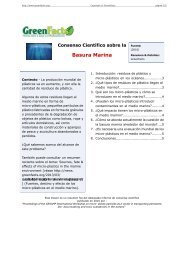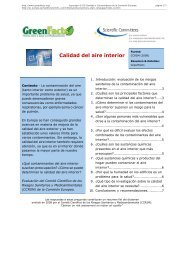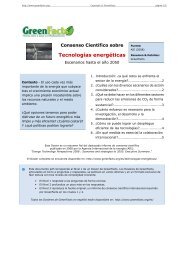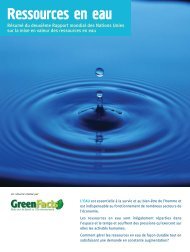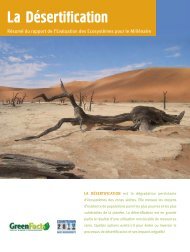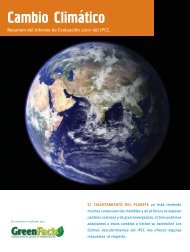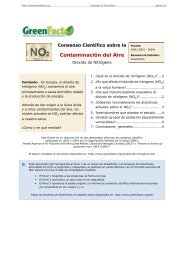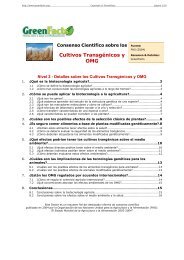Facts on Water Resources - GreenFacts
Facts on Water Resources - GreenFacts
Facts on Water Resources - GreenFacts
You also want an ePaper? Increase the reach of your titles
YUMPU automatically turns print PDFs into web optimized ePapers that Google loves.
How can the growing demand for water be met?Meeting a c<strong>on</strong>tinuous and ever increasing demandfor water requires efforts to compensate for naturalvariability, and to improve the quality and quantityavailable.Rainwater has been collected for thousands of yearsin many parts of the world. Today, this technique isused in Asia to replenish underground supplies. It isrelatively inexpensive and has the advantage ofallowing local communities to develop and maintainthe required structures themselves.© Daniele SangermaniDiverting surface water into the ground can helpreduce losses from evaporati<strong>on</strong>, compensate forvariati<strong>on</strong>s in flow, and improve quality. Middle Eastand Mediterranean regi<strong>on</strong>s are applying thisstrategy.Dams and reservoirs have been built to store waterfor irrigati<strong>on</strong> and drinking. Moreover dams canprovide power and help c<strong>on</strong>trol floods, but they canalso bring about undesirable social andenvir<strong>on</strong>mental impacts.Transferring water between river basins can also help alleviateshortages. China, for instance, already has major interbasin links, and isplanning more. The impact of these projects <strong>on</strong> people and theenvir<strong>on</strong>ment must be m<strong>on</strong>itored closely.Wastewater is now reused for different purposes in many countries,especially in the Middle East, and this practice is expected to grow.Worldwide, n<strong>on</strong>-potable water is used for irrigati<strong>on</strong> and industrialcooling. Cities are also turning to water re-use to supplement drinkingwater supplies, taking advantage of progress in water treatment.Desalinated water – seawater and other salty water that has beenturned into freshwater – is used by cities and by industries, especially inthe Middle East. The cost of this technique has dropped sharply, but itrelies heavily <strong>on</strong> energy from fossil fuels and raises waste managementand climate change issues.How could water resources be developed sustainably?Using water resources sustainably is challenging because of the manyfactors involved, including changes in climate, the natural variability ofthe resource, as well as pressures due to human activity.At present, most water policy is still driven by short-term ec<strong>on</strong>omic andpolitical c<strong>on</strong>cerns that do not take into account science and goodstewardship. State-of-the-art soluti<strong>on</strong>s and more funding, al<strong>on</strong>g withmore data <strong>on</strong> water resources, are needed especially in developingnati<strong>on</strong>s.To assess the state of our water resources, we must fully appreciate theroles of different parts of the water cycle – such as rain, meltwater fromglaciers, and so <strong>on</strong>. Otherwise, it remains difficult to develop adequateprotecti<strong>on</strong> and mitigati<strong>on</strong> strategies.Poor water quality and unsustainable use of water resources can limitthe ec<strong>on</strong>omic development of a country, harm health and affectlivelihoods. More sustainable practices are starting to be adopted.The traditi<strong>on</strong>al resp<strong>on</strong>se to rising demand for water was to store surfacewater in reservoirs, divert flow to dry regi<strong>on</strong>s and withdraw groundwater.Now these methods are increasingly supplemented by water reuse,desalinati<strong>on</strong> and rainfall harvesting. Certain regi<strong>on</strong>s are even going tothe extreme of exploiting n<strong>on</strong>-renewable groundwater resources.Some countries have programs to reduce demand and losses from urbanwater distributi<strong>on</strong> systems but more efforts are necessary. However, thiswill involve changes in behaviour requiring educati<strong>on</strong> and politicalcommitment. Such efforts to c<strong>on</strong>serve water and reduce demand are not<strong>on</strong>ly useful in regi<strong>on</strong>s where water is in short supply, they can also bringec<strong>on</strong>omic benefits in wetter regi<strong>on</strong>s.Decentralised approaches to water resource management that focus <strong>on</strong>river basins are increasingly pursued even across borders. Exchanginginformati<strong>on</strong> between countries that share river basins will yield bothec<strong>on</strong>omic and envir<strong>on</strong>mental benefits.When managing water resources, more attenti<strong>on</strong> should be paid toincreasing existing natural resources and reducing demand and losses.




